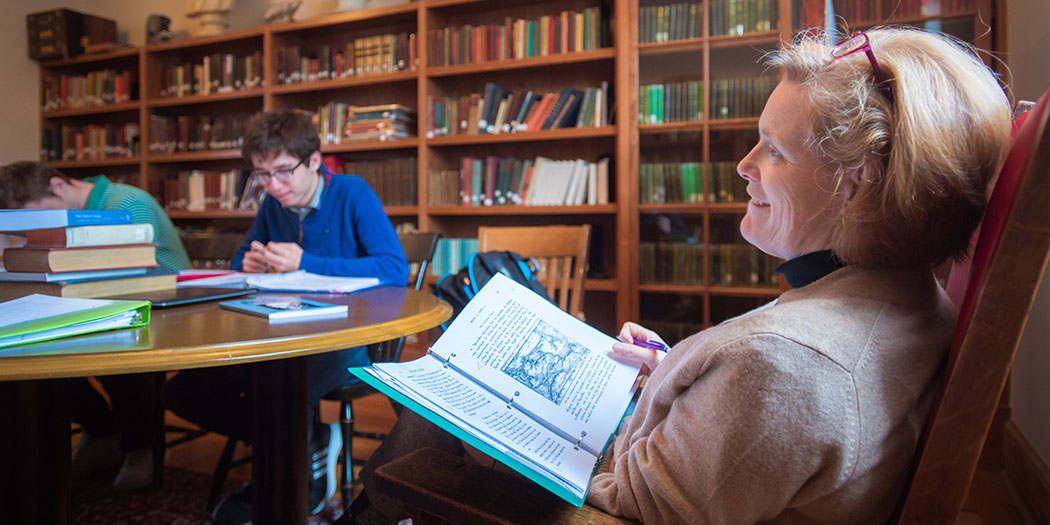古典语言与文明
古典学课程的主要目的是使学生能够用希腊语和拉丁语阅读古典时期伟大作家的作品。这些开创性的作品--2000多年来受到普遍推崇--通过解决永恒的问题,给学生提供了对自己生活和时代的看法。人类的存在是否有意义和价值?为什么以及如何使生活变得既滑稽又悲惨?做人的意义是什么?人类为什么以及如何既自私又利他?是否有什么东西值得去死或去活?古典作家之所以经久不衰,是因为他们提出这些问题的方式,也因为他们对这些问题的答案。
学习一种有2000多年历史的语言的学生很快就会意识到,人类的某些见解和价值观是历久弥新的。所有的人都必须面对死亡的现实;所有的人都必须找到能赋予他们生命意义的东西。贪婪和自私在每一代人中都存在,甚至茁壮成长--有人会说,但最终改变和赢得他人心智的是勇气和自我牺牲。我们相信,通过与维吉尔和荷马一起,用他们自己的语言,在这些作者与生活中的困难,但决定性的问题搏斗时,学生们为生活做了更好的准备。
学校要求学生学习三年的拉丁语,从第一天起,学生就开始从拉丁语词汇的学习中获益。由于一半以上的英语单词来自于拉丁语根,学生在学习拉丁语的同时也提高了英语词汇量。最近的研究表明,拉丁语学生在SAT考试中的口头部分得分一直高于学习其他外语的学生。同样,学生在掌握了拉丁语语法后,往往会第一次理解和学习英语语法。我们相信,学生为掌握拉丁语而必须掌握的精确性和纪律性使他们能够更有分析性和批判性地阅读英语,并能更简洁流畅地书写英语。拉丁语不仅是英语的母亲,也是罗曼语的母亲。因此,它是学习这些语言的一个自然跳板。
The main reason we want a boy to learn Latin, however, is so that he can read the great Roman authors in their own tongue. No English translation can convey the succinct, deliberate, and even ruthless excitement of Caesar, the inexorable logic and rhetorical cadence of Cicero, or the spiritual grandeur and gripping drama of Vergil. The past few years, Classics teachers have sponsored trips to Rome in order to experience in situ the language, history, and art studied so fervently.
学习希腊语的理由与学习拉丁语的理由是一样的。可以说,希腊语的词汇和细微差别甚至比拉丁语更丰富。当然,希腊作家在罗马人眼中是巨人,在我们眼中是巨人。由于我们的孩子在长大后才开始学习希腊语(三年级),他们已经有三年的拉丁语学习经历,因此在这种高度转折的语言中游刃有余。他们可以快速地学习希腊的伟大作家:希腊语第二年的大部分时间都用于学习 共和国 (第一册)和其他柏拉图著作,而第三年的学生则学习 荷马的《伊利亚特》。三年级学生学习荷马的《伊利亚特》。偶尔也会有去希腊的旅行。每年全校性的拉丁语和希腊语朗诵庆祝活动之一是Exelauno日。
古典语言与文明课程
-
拉丁语1
(六年级)拉丁语1的重点是让学生了解拉丁语的基础知识。英语和拉丁语的语法用法被广泛地比较,以达到相互促进的目的。 一年级拉丁语。传统教材Jenney的《一年级拉丁文》,内容全面。该课程强调英语从拉丁语根的衍生,强调形式、句法和词汇。对英语和拉丁语语法的广泛比较加强了对这两种语言的机械性的理解。该课程还试图通过课堂讨论和就个人感兴趣的话题所做的报告,将罗马人重塑为真实的人。读物来自 古罗马。古代罗马:历史入门》和《古典神话及更多》中的读物。作为基本教材的补充。
-
拉丁语2
(五年级)拉丁语2班力争掌握基础知识。詹妮 一年级拉丁文已经完成。当掌握了必要的形式、词汇和语法后,课程转向里奇的拉丁文读物。 词汇表和其他合适的文本。继续复习语法和研究来自拉丁语根的英语衍生物。 古罗马。古罗马:历史入门》和《古典神话及其他被进一步利用。
-
拉丁语3
(Class IV) Latin 3 assumes a familiarity with the fundamentals of grammar and concentrates on the literary contributions of a range of Roman authors. The text is Jenney, Second Year Latin. Authors read include Caesar, Livy, Ovid, and Pliny. Required vocabulary is drawn from the College Entrance Examination Board Word List, Levels I and II. John Colby, Review Latin Grammar, is used for weekly composition exercises.
-
拉丁语 4
(三级选修课)拉丁语4是一门文学课程(有适当的语法复习),强调拉丁语的 "无视翻译 "的美感、复杂性和表达的庄严性(包括在散文和诗歌中),这在包括凯撒、西塞罗、普林尼和萨卢斯特在内的不同作者群体中可以找到。该课程强调学习文学手段,分析 "真正的 "拉丁文学,以及欣赏拉丁文的各种表现形式。主要课文是西塞罗的《第一次卡提拉尼亚演说 》(斯蒂德曼)、萨卢斯特的《卡提拉尼亚之战》(斯蒂德曼)和《凯撒学院》(斯蒂德曼)。.维吉尔。 埃涅阿斯二 (法尔编辑),这是特洛伊木马故事的经典之作,也是春季学期的核心内容,既是文学分析的载体,又是典型的可读故事。要求的词汇来自于 大学入学考试委员会词汇表一至四级。
-
Honors Latin 5
Honors Latin 5, primarily an exploration of the Aeneid, aims to deepen students’ appreciation of epic poetry and Roman values during the age of Augustus. The Aeneid recounts how Aeneas, a refugee called upon by the gods, led his followers west to establish a new empire in Italy after the sack of Troy. It is the story of how a determined hero overcomes the destructive forces all around and within him. Through daily translation exercises, students will improve their ability to read Latin fluently and understand its contextual nuances. Close examination of the Aeneid will highlight the interplay between cosmic fate and human agency, as well as the balancing act between duty and desire. The course will emphasize analyzing imagery, metrical techniques, character development, and identifying recurring motifs and overarching themes within the text.
-
拉丁语 6
(一级选修课) 拉丁语6的秋季课程 主要通过仔细阅读贝特罗尼乌斯的作品来关注讽刺的主题 。 萨特里科》(The Satyricon) 贝特罗尼乌斯的作品。该课程还对其他讽刺作品进行了抽样调查,范围从 乔纳森-斯威夫特 到 三人行》(The Three Stooges,从乔恩-斯图尔特 到 周六夜现场.在春季,从罗马最富情感的抒情诗人卡图卢斯那里读到了加里森的选段。 学生的卡图卢斯.
-
希腊语 1
Greek 1 aims not only at gaining control of the language but also at comprehending some of the ideas of the Hellenistic world which have decisively contributed to Western Civilization. The text is Alpha to Omega (Groton), supplemented by materials prepared by the department. Mastery of form recognition, vocabulary (including English derivations), and grammar is stressed, with major emphasis placed on reading and interpreting original Greek.
-
希腊语 2
After a review of the basic grammar and paradigms, Greek 2 spends the remainder of the fall term finishing Alpha to Omega and crossing the bridge to original Greek with materials prepared by the department. Reading from the works of Aesop and Xenophon is the focus of the winter term. In the spring, the major topic is Socrates (man, teacher, philosopher), as depicted in Aristophanes’ Clouds and Plato’s Apology.
-
希腊语 3
在 希腊语3中,秋季学期专门研究荷马的《伊利亚特》。重点是了解史诗的历史,文学中的英雄形象,以及迈锡尼社会的价值观。课文是Benner, 伊利亚特》选集.在春季学期,阿里斯托芬的《蛙》将作为研究5世纪末雅典政治的基础。根据学生的兴趣,春季课程还包括希腊悲剧的读物:欧里庇得斯。 美狄亚 (Elliott编著)或索福克勒斯。 安提戈涅 (由布朗编辑)。

